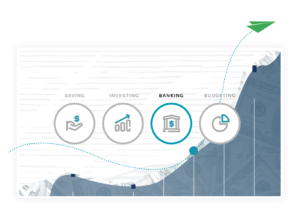Compounding Wisdom: Banking 101

This is the latest in our series of introductory “101” financial guides. Each guide reveals a set of wise actions as well as a set of behaviors to avoid. The goal? Help you make smart choices at every turn in your financial road trip. We have seen financial successes exponentially enhanced when wise financial decisions are made repeatedly over a long period. This month’s focus is Banking. Online banking, online banks, and fintech firms are rapidly changing the competitive landscape, so staying up to date can be challenging.
Compound Wisdom Actions
- Good Things Come in Threes – A great start is 1 checking account, 1 savings account for your emergency fund, and 1 savings account for near-term large purchases.
- Know the Fine Print – Understand the fees within your account and how to avoid them.
- Don’t Live on the Edge – Keep a cushion in your checking account to avoid overdrafts.
- Know Where You Stand – With smartphone access and reduced use of checks, it’s easy to know your real balance and there is less need to “balance your checkbook” each month.
- Hold On – Plan ahead so you aren’t surprised when a deposit is placed on hold and the funds are not instantly available.
- Stay Alert – Review your account’s balance and transaction alert settings and update them to match your preferences.
- Stay Safe – Enable two-factor authentication, and never access your bank app on public Wi-Fi.
- Go on Auto-Pilot – Use your checking account as a hub to auto-pay your bills instead of a credit card (which may be reissued every time fraud is suspected).
- Get the Kids Involved – A savings account for a child in middle school can be a great tool to start them off in learning about banking.
- Don’t Simply Pass it Along – Young adults should investigate the low-cost nature of online banks and not just adopt their parent’s brick-and-mortar bank.
- No Interest – While the national banks continue to offer low-interest rates on checking accounts, many online banks pay cashback when you use their debit card, making it a potentially wise choice for younger adults.
Behaviors to Avoid:
- Over-drafting Often – Regular overdrafts signal you are not in control of your finances.
- Surprise, Surprise – Not knowing your balance weekly or even daily can result in a costly surprise.
- Banking Inertia – If your bank is assessing fees or delivering poor service, pull the plug and find a better solution.
- Paying Avoidable Fees – If you are being assessed fees each month, you should ask how to eliminate them.
- Walking Around with Your Emergency Fund – Never use your checking account as a place to save for emergencies – create a dedicated savings account that is less easy to access (aka no debit card).
Feel free to pass this along if you know someone who might benefit from the guidance and look for more from me in this monthly series.
I lead our Hillfolio level client service and planning efforts, learn more about me here and reach out if I can help you put the magic of compounding on your side.

